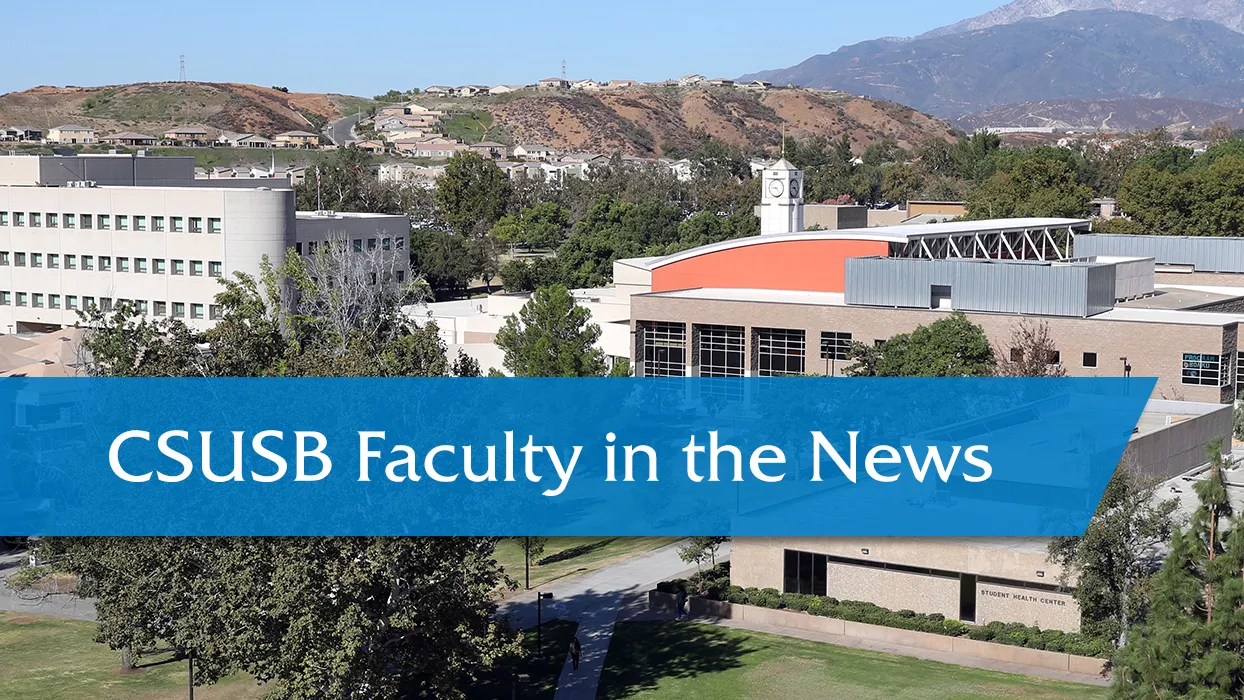
NOTE: Faculty, if you are interviewed and quoted by news media, or if your work has been cited, and you have an online link to the article or video, please let us know. Contact us at news@csusb.edu.
CSUSB professor interviewed about rise of the ‘knowledge economy’ in the Coachella ValleyPalm Springs LifeOct. 4, 2017
More than a quarter of the Greater Palm Springs region’s jobs are in the diverse knowledge economy and the demand for college-educated workers continues to grow. Experts say the combined forces of disruptive technology, rising minimum wages, and a growing consumer preference for self-service will significantly reduce the number of service-sector jobs over the next 30 years.
“Look at the airlines,” says James Estes, professor of finance at the California State University, San Bernardino Palm Desert Campus. “The counters used to be filled with ticket agents, now they’re electronic kiosks. For students in school today, 65 percent of the jobs will be in fields that don’t exist yet. Whatever’s going to happen, it’s not what we expect — because we haven’t yet thought of it.”
The full article may be read at “The rise of the knowledge economy.”
The tragedy in Las Vegas on Oct. 1 prompted news media to see the analysis of Brian Levin, criminal justice professor and director of the CSUSB Center for the Study of Hate and Extremism.
CSUSB counter-terrorism expert comments on use of law enforcement dronesLA WeeklyOct. 4, 2017
One Southern California professor says the Las Vegas mass shooting on Oct. 1 should reopen the debate about how drones can be used to make mass gatherings like Sunday's concert in Vegas safer.
'You could use drones for surveillance, but also to neutralize an assailant,' says Brian Levin, a criminal justice professor and director of The Center for the Study of Hate and Extremism at Cal State San Bernardino.
'You could have a drone up in two minutes in Las Vegas and fired an incendiary device into [the shooter’s] room,' he says. 'If he had weapons of mass destruction, you're going to wish you had a drone.'
The professor is not necessarily guaranteeing a drone could have saved the day. He's arguing that authorities shouldn't rule out new technology for fighting this kind of crime. 'It is not for me to say how effective a drone would have been in Las Vegas,' Levin says. 'The question is for the next situation.'
The complete article can be read at “Could drones take out mass shooters?”
The discussion of law enforcement’s use of drones was also covered in:
- The Los Angeles Daily News/Southern California News Group, “Why some say Las Vegas mass shooting proves LA law enforcement should use drones,” published on Oct. 3;
- The Drive, “Should we let police use drones post emergencies such as the Las Vegas shooting?” on Oct. 4;
- The Drone Life, “Could Police Drones Help Stop Mass Violence?” on Oct. 4.
Labeling Las Vegas mass shooting ‘terrorism’ more complicated than just calling it that, CSUSB professor saysBustleOct. 3, 2017
When both President Donald Trump and Clark County Sheriff Joseph Lombardo stopped short of calling the Las Vegas massacre an 'act of terrorism,' many Americans were left wondering how a shooting rampage that left at least 58 concert-goers dead and more than 515 injured could be anything but. Yet in an age where mass shootings are increasingly shaking Americans' sense of public safety, not all are acts of terrorism.
'We know that people fear crime that has a more random component to it,' Brian Levin, director of the Center for the Study of Hate & Extremism at California State University, San Bernardino and a former officer with the NYPD tells Bustle. 'Striking out indiscriminately at innocent people that have no direct connection to the assailant is a real horrendously scary type of event.'
As a federal charge, terrorism is defined as the 'unlawful use of force and violence against persons or property to intimidate or coerce a government, the civilian population, or any segment thereof, in furtherance of political or social objectives.' Attacks by ideologically-motivated groups like ISIS and Al Qaeda fit the charge, and a spate of terrorist activity in the years after 9/11 molded Americans' understanding of the concept. But America's history of domestic terrorism is nearly as old as the country itself, and could shed light on why the term is so hotly debated.
The complete article may be read at “People want to label the Las Vegas attack 'terrorism,' but it's far more complicated than you think.”
CSUSB professor discusses counter-terrorism efforts in aftermath of Las Vegas mass shootingLos Angeles TimesOct. 2, 2017
For decades, law enforcement has tried to keep one step ahead of terrorists who target large groups and venues.
Authorities have beefed up security, employed metal detectors and chemical weapons detectors, erected barriers and more recently tried to better control traffic choke points where attackers strike as people tried to flee. But the Las Vegas mass shooting underscored how difficult it is to keep large groups safe despite precautions. The Route 91 Harvest country music festival included plenty of security and many of what today are normal precautions.
'This is the new normal,” said Brian Levin, a counter-terrorism expert and professor at Cal State San Bernardino. 'We are now seeing lone wolves being able to create war at our entertainment venues.'
Levin and others said some law enforcement agencies have envisioned this type of scenario.
Experts say that after the Las Vegas mass shooting, there will be a reassessment nationwide of how to protect large open space gatherings.
Levin said government agencies may now consider using armed drones to disarm suspects.
The complete article may be read at “From the 32nd floor, Las Vegas gunman caused mass carnage despite security measures at concert.”
These news clips, and others, may be found at “In the Headlines” on the Inside CSUSB website.